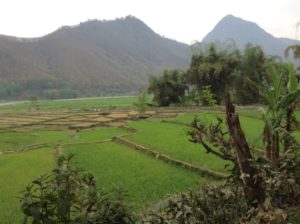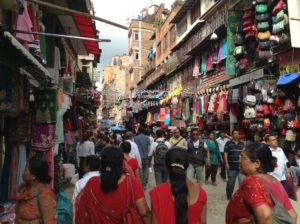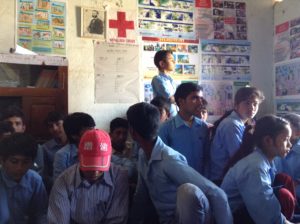Posted by Maya Kapsokavadis, International Services Program Officer supporting country programs in Bangladesh, Myanmar/Burma and Nepal at the American Red Cross
 As a Program Officer at the American Red Cross, I understand the devastating impact disasters have on people and the immense effort it takes to implement a successful humanitarian intervention. In my role, I am responsible for South Asia, which includes some of the most hazard prone countries in the world. In fact, my first trip to Nepal was unforgettable not because I was traversing its idyllic countryside, but because I was seized by an absolutely paralytic fear of being in an earthquake (something hard for a California native to admit).
As a Program Officer at the American Red Cross, I understand the devastating impact disasters have on people and the immense effort it takes to implement a successful humanitarian intervention. In my role, I am responsible for South Asia, which includes some of the most hazard prone countries in the world. In fact, my first trip to Nepal was unforgettable not because I was traversing its idyllic countryside, but because I was seized by an absolutely paralytic fear of being in an earthquake (something hard for a California native to admit).
“Typical Kathmandu”
 A local partner organization had arranged an introduction to “typical Kathmandu” – a walk that traversed some of the most physically impressive (not in a good way) parts of the city where unplanned urbanization was at its worst. Buildings loomed overhead on streets so narrow that no emergency vehicle could possibly gain access to them. Staring up at telephone towers bending under the weight of exposed wires, I experienced a sense of panic that never surfaced in my past work. The same pattern repeated as I traveled to remote areas of Nepal where villages were weakly connected by bumpy, pot-holed, half-paved roads that slinked tenuously across mountains with breathtaking views and plummeting falls. I held my breath more often than not and refined the technique of sleeping through unease. This exposure visit increased my awareness of the potential ill-effects of sub-standard construction techniques and the need to educate the public about the risks of rapid, unplanned, and unregulated building.
A local partner organization had arranged an introduction to “typical Kathmandu” – a walk that traversed some of the most physically impressive (not in a good way) parts of the city where unplanned urbanization was at its worst. Buildings loomed overhead on streets so narrow that no emergency vehicle could possibly gain access to them. Staring up at telephone towers bending under the weight of exposed wires, I experienced a sense of panic that never surfaced in my past work. The same pattern repeated as I traveled to remote areas of Nepal where villages were weakly connected by bumpy, pot-holed, half-paved roads that slinked tenuously across mountains with breathtaking views and plummeting falls. I held my breath more often than not and refined the technique of sleeping through unease. This exposure visit increased my awareness of the potential ill-effects of sub-standard construction techniques and the need to educate the public about the risks of rapid, unplanned, and unregulated building.
Nepal Earthquake Response
Until this past Saturday, I had never experienced a disaster in a country I intimately knew—where the people at the heart of the crisis were my people—not only my coworkers, but friends I’d shared dinners and deep conversations with—people who made long (often lonely/hotel ridden) deployments exciting and inspiring. As the response mounts from the American Red Cross, I am overwhelmed with concern for the safety of our partners, local staff and volunteers and the people of Nepal.
The staff we have been in contact with are struggling to travel across a country that lacks the infrastructure to accommodate their movements. Most are walking, tens of hours, to access vulnerable villages in earthquake and landslide-affected districts. Logistics, transport and access, massively difficult in the best of situations, is a top concern for responders. Many deployed staff still struggle to enter this land-locked country. With only one international airport, the response efforts are constrained and much-needed relief supplies and early responders cannot reach those in need. Moreover, Nepal has only two doctors out of every 1,000 people; a daunting fact given the rising health needs as survivors are pulled from the rubble and require urgent medical care. As I sit, safely behind my desk, I think of my colleagues, and am humbled by their courage and selflessness. They are first responders, but also those who have been most affected. Mothers and fathers, sons and daughters, these staff and volunteers have arguably put the needs of their communities ahead of their own.
Red Crossers in Nepal
 I have been most impressed by the longevity and dedication of my counterparts at the Nepal Red Cross. Volunteers supporting this national society forever changed my concept of what it means to be a Red Crosser. I quickly lost track of the number of people who had spent the majority of their lives in voluntary service to the Red Cross mission and the communities they worked with. Whether teaching children life-saving techniques in the event of a disaster or helping communities identify local solutions to build resilience; it is the volunteers who are at the heart of Red Cross work. This emergency is a reminder for me of the invaluable work we do, the sacrifices we make, and the beauty of the human spirit when we come together to support each other.
I have been most impressed by the longevity and dedication of my counterparts at the Nepal Red Cross. Volunteers supporting this national society forever changed my concept of what it means to be a Red Crosser. I quickly lost track of the number of people who had spent the majority of their lives in voluntary service to the Red Cross mission and the communities they worked with. Whether teaching children life-saving techniques in the event of a disaster or helping communities identify local solutions to build resilience; it is the volunteers who are at the heart of Red Cross work. This emergency is a reminder for me of the invaluable work we do, the sacrifices we make, and the beauty of the human spirit when we come together to support each other.
